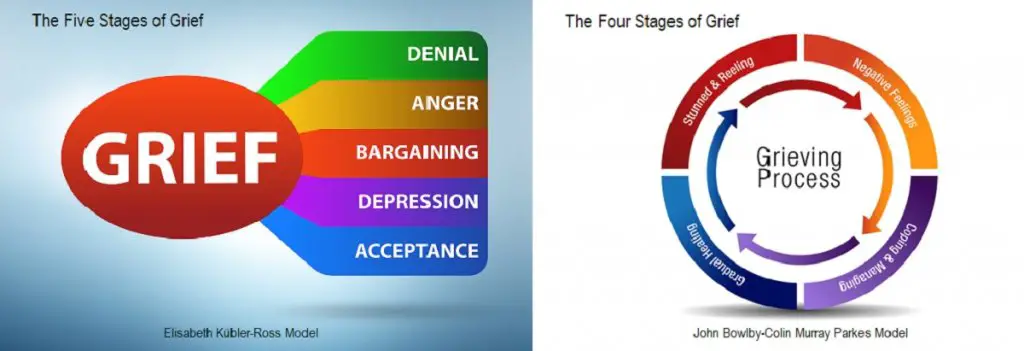After a loss, a person might feel sadness, anger, and guilt. While experiencing grief is personal, most people learn how to manage it in their own way over time. If the feelings surrounding the death of a loved one continue to negatively impact our life, grief counseling can help you manage your grief.
When people feel grief after a loss, they may express with through mourning. Some cultures prescribe an official mourning period distinguished by rituals of how they should dress and act. After 30 days, six months, or a year, they can stop mourning. Unfortunately, working through the internal process may be a longer journey than expected, so some find grief counseling to be helpful.

Table of Contents
Grief Has Multiple Stages
Grief has multiple stages that people who have suffered a great loss, whether of a family member or close friend, must go through. Elisabeth Kübler-Ross, a Swiss-American psychologist, coined the term the five stages of grief (denial, anger, bargaining, depression, and acceptance) and explained that although most people pass through all of these stages at some point in their grief process, everyone will experience grief differently.
British psychiatrists John Bowlby and Colin Murray Parkes proposed four phases of grief that group some of the dynamics of the process differently. The Four Phases of Grief are:
- Shock and Numbness: Right after death, a person might feel numb and drained .in response to the shock of the loss.
- Yearning and Searching: The grieving person might then experience a variety of feelings, such as sadness, anger, anxiety, and confusion. They feel empty.
- Disorganization and Despair: In an attempt to accept the loss, the grieving person experience feelings of apathy, anger, despair, and hopelessness. Their feeling might cause them to withdraw from friends and activities they love.
- Reorganization and Recovery: As the grieving person finds a new normal in their life, they might change their focus from anger, sadness, and despair to positive memories of their loved one. They begin to feel more like themselves, and any physical symptoms accompanying the loss (insomnia, weight changes, crying) might diminish.
The Bowlby and Parkes theory is an extension of their work on attachment theory, loss, and grief in children. which they applied to anyone who is grieving. The work of Kübler-Ross is based on her work with dying patients.
Other experts on bereavement counseling list 7 or even 12 stages of grief. It really does not matter how many stages you list, no two people experience grief exactly the same. Grief is a process and a difficult time you can’t rush through. Any theory is just that – a theory that may be helpful in understanding changing emotions and mental states.
It is also important to understand that grief is not linear or sequential. In other words, you don’t have to go through them in order, not everyone experiences all the stages, and sometimes you can backslide into a stage you thought you had left behind. Are you seeing now how complicated grief is?
For people, grief is so complex that it does not seem to subside over time.
What Is The Best Thing To Do For Grief?
When someone experiences a loss, they might need outside help as grief is not always easy to work through without other perspectives. Either a grief counselor (or family members or friends) can help a grieving person in three ways:
- Let them talk about the person who passed away.
- Ask them about trauma surrounding the loss of the person.
- Allow them to speak about their loved one in a safe space.
Sometimes a significant loss of someone who has been with you for a long time can be very difficult to process. When the grieving person wants to discuss the loss but other close friends and family members are not ready to (or are too overwhelmed by their own grief that they cannot help,) a good grief therapist can be helpful. An impartial third person who is not grieving like everyone else in the bereaved person’s life, the counselor also has the tools to help.

What Is A Grief Counselor?
A grief counselor is a mental health professional who is experienced in helping support those who are going through grief. Also known as bereavement counselors, these individuals help people work their way through the stages of grief.
Sometimes people have been to a licensed marriage and family therapist (LMFT) at some point in their life and feel comfortable going to that person after a loss. Seeing someone you trust can be very valuable if you are experiencing depression, anxiety, or something you are unsure how to navigate. If, after a period of time, you don’t feel like you are improving, a licensed grief therapist might be in order.
What Is The Best Kind Of Therapy For Grief?
You can do different things to handle a difficult part of life, such as learning to live without a loved one. It also should be noted that there are many types of grief, and grief therapy can be unique to each situation. Different types of therapy can include:
- Grief Support Groups: Support groups help people feel better overall well-being by talking through the emotional pain with others who have been through this.
- Psychotherapy: In psychotherapy, they use talk therapy to help you work through your problem (including grief).
- Cognitive Behavioral Therapy: CBT will emphasize helping you to be your own therapist. That might sound crazy, but it is not. Clients are given exercises and homework to do outside of the sessions. These activities help the patient to develop coping skills and work on changing their own thinking.
- Behavior Therapy: In behavior therapy, the goal is to change your reaction to a particular stimulus. If you freeze up every time you get in a car after losing a loved one in a car crash, behavior therapy will work on slowly getting you back into a vehicle without a panic attack.
When Should You Start Grief Counseling Or Suggest It For A Loved One?
While each person grieves in their own time, there are some hints that the person may be grieving too deeply for too long, and require professional help. Are you, your friend, or a family member:
- Not sleeping
- Not eating well
- Losing weight
- Experiencing physical symptoms of sickness such as nausea, headache, etc.
- Crying frequently, even weeks after the funeral
- Unable to perform simple daily tasks
- Stays in bed or seems unwilling to leave the house
- Does not seem to have a support system (or is unwilling to use it)
- Has a history of substance abuse
If so. grief counseling might be useful.

What Should Be The Goal Of Grief Counseling?
The goal of grief counseling is not to stop grief, because that is not realistic. The goal is to help people who are bereaved work through the grieving process. They will help you to work through the feelings you are having.
Grief counseling helps the client to recognize that they are experiencing normal human feelings and reactions to a great loss. Sometimes I think people want to rush through grief, loss, and other difficult feelings. That just is not realistic.
No one expects someone who is grieving to get through things overnight; however, the goal is to allow you to live as normal a life as possible as quickly as you can. Not everyone is ready to return back to work in a few days, for example. For other people, having something “normal” to focus on is necessary.
Specific goals can include:
- Working to adapt to the loss and learn how to live without the other person.
- Overcoming obstacles that arise both with the loss and in the coming months.
- Helping people to grieve in a healthy way.
- Learning to understand your emotions.
- Giving the person a place where they can receive emotional support.
- Teaching the person about grief and what to expect.
- Ensuring the person grows through the loss.
What’s The Prognosis? Can Grief Be Cured?
Can grief be cured? Not in the sense that you might think. Grief does not just go away. Certainly, over time, it gets easier to manage, but healing is not a 1,2,3 cure.
Grief typically lessens over time, but the thing is, that timeframe is different for everyone. All you can do is work through the process and be patient.

